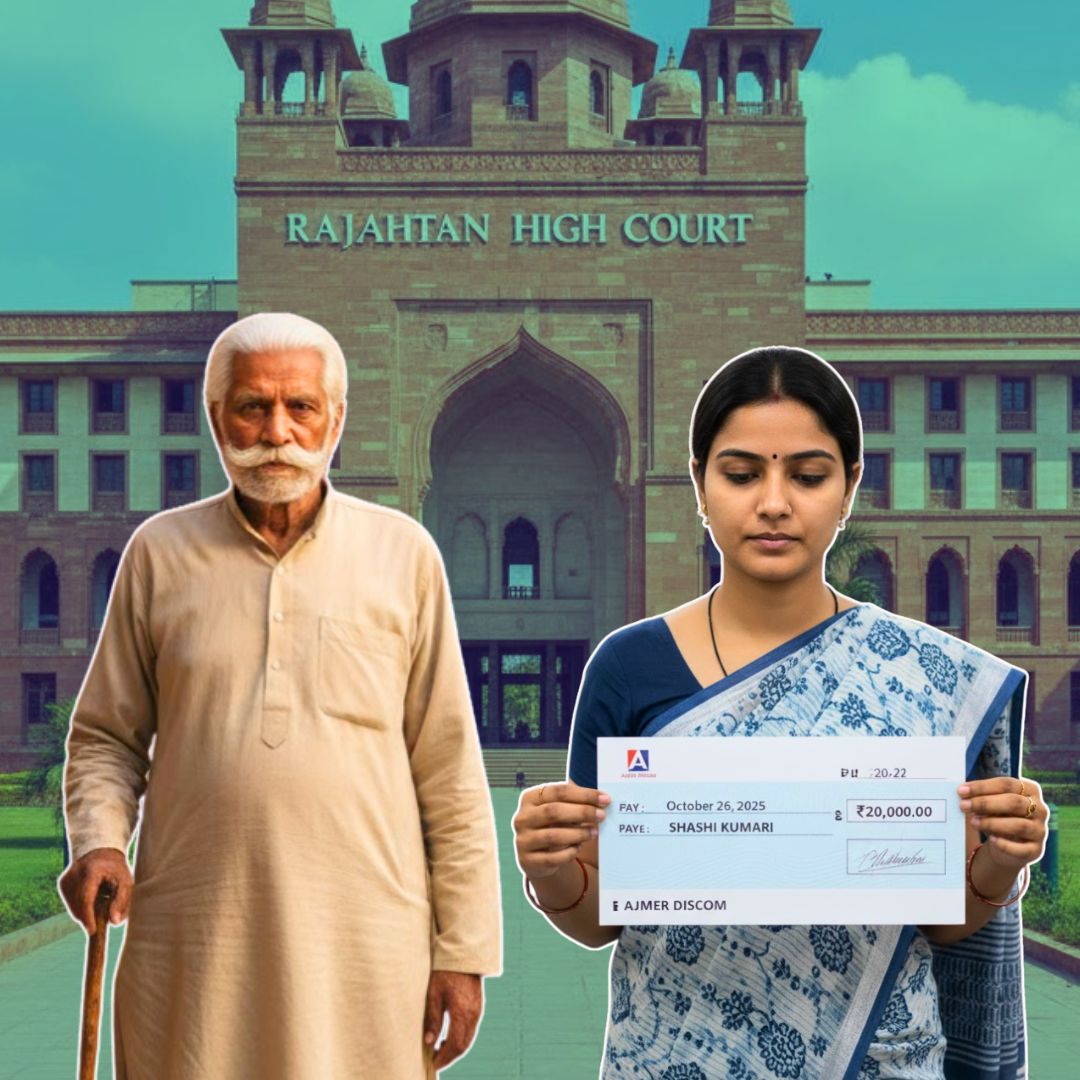In a rare and significant ruling, the Rajasthan High Court’s Jodhpur Bench has directed Ajmer Discom to deduct ₹20,000 every month from the salary of Shashi Kumari, daughter-in-law of Bhagwan Singh from Kherli village in Alwar.
This amount is to be directly transferred to Bhagwan Singh’s bank account to ensure his financial maintenance for the rest of his lifetime, starting November 1, 2025.
The verdict highlights the judiciary’s firm stance on the ethical and legal responsibilities of children and their spouses towards elderly parents, reinforcing the Maintenance and Welfare of Parents and Senior Citizens Act, 2007.
Court’s Assertive Judgment Emphasises Elder Care Responsibility
Presiding Justice Farzand Ali of the Jodhpur Bench delivered the ruling after careful examination of the facts and legal provisions. He pointed out that Shashi Kumari had availed a compassionate appointment as a Lower Division Clerk in Ajmer Discom following the death of her husband, Rajesh Kumar-Bhagwan Singh’s son.
At her appointment, she had signed an affidavit committing to live with and care for her in-laws. However, shortly after joining service, she married again and walked out of the household, neglecting her father-in-law’s welfare.
The court underscored that the doctrine of promissory estoppel applies: when a person accepts benefits on a legal assurance, they cannot evade the resulting obligations. Justice Ali elaborated that the term “family” in compassionate appointment schemes is inclusive of all dependents, especially elderly parents who rely heavily on the deceased family member’s support, not just the widow.
Furthermore, Shashi Kumari had already received 70% of the provident fund and compensation benefits, making her neglect more callous.
Ajmer Discom has pledged immediate compliance with the court’s order, ensuring ₹20,000 per month will be deducted and transferred to Bhagwan Singh’s account without delay. A senior official at Ajmer Discom commented that this order serves as a precedent underscoring institutional responsibility in upholding social justice and elder rights.
Background: Tragedy, Compassionate Appointment, and Abandonment
Bhagwan Singh’s son, Rajesh Kumar, employed as a Technical Assistant with Ajmer Discom, died under circumstances that left his father dependent on the deceased son for support. Initially, Bhagwan Singh himself was offered a compassionate appointment to maintain financial stability.
However, he recommended that the job be allotted to his widowed daughter-in-law, Shashi Kumari, who was a homemaker and vulnerable after her husband’s death.
Shashi Kumari’s appointment came with an explicit affidavit promising to fulfill family obligations, a condition stipulated by government rules to ensure that benefits granted on compassionate grounds serve the intended families.
Unfortunately, her subsequent remarriage and abandonment of Bhagwan Singh added a heartrending dimension to the case, exposing loopholes in social support systems for the elderly who have no one to depend upon.
Seeking justice, Bhagwan Singh initially petitioned for maintenance through the Maintenance Tribunal established under the 2007 Act. The tribunal had earlier ordered partial support payments, but the issue escalated to the High Court due to Shashi Kumari’s refusal to comply voluntarily, prompting judicial intervention to enforce financial responsibility by lawful means.
Legal Significance and Wider Social Implications
This ruling redefines accountability within families by emphasising that rights come with duties. The Maintenance and Welfare of Parents and Senior Citizens Act, 2007, was enacted specifically to address such cases where elderly parents face neglect from their own children or dependents. The law mandates that adult children and their spouses ensure the maintenance of parents who cannot maintain themselves, using all legal means including salary deductions where necessary.
Justice Ali’s verdict also challenges societal attitudes that often relegate elder care to charity or ignore it altogether. It stresses the judiciary’s role in protecting vulnerable senior citizens’ dignity and welfare when familial bonds break down.
The ordered salary deduction serves as a powerful reminder that compassionate appointments are not merely employment benefits but social contracts with inherent moral and legal obligations.
Legal experts note this judgment as pioneering in its explicit application of promissory estoppel to family welfare laws and its inclusive interpretation of “family” in compassionate appointments. Furthermore, it addresses an often overlooked demographic-elderly men-who traditionally do not have robust protective mechanisms despite acute vulnerability.
The Logical Indian’s Perspective
The Logical Indian welcomes this verdict as a beacon of hope and justice for many elderly citizens battling neglect in silence. The ruling aligns with core values of empathy, kindness, and societal harmony, affirming that senior citizens deserve respect, care, and financial security as a right, not a favour.
It urges families to approach elder care as a shared responsibility intertwined with mutual dignity rather than a burden or obligation to evade.
We stand by the principle that legal instruments must be complemented by societal awareness and ethical consciousness in nurturing intergenerational trust and support.
As India faces rising challenges of ageing populations, such judicial pronouncements encourage constructive dialogue on elder rights and mechanisms for sustainable care.












